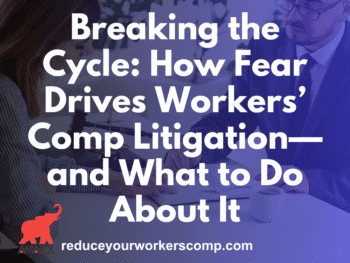
When is Voluntary Resignation Appropriate?
Seeking the voluntary resignation of an employee as part of a global workers’ compensation settlement should not be a part of every claim. There are a number of legal and practical barriers that warrant careful consideration when making this a part of the negotiation and settlement process.
Click Link to Access Free PDF Download
“Avoid the 3 Primary Reasons Injured Workers’ Hire Attorneys”
When evaluating a claim, it is important to be in contact with trained legal counsel. Examples of this include several state workers’ compensation acts that explicitly prohibit this practice. If there is the appearance of even suggesting an employee resign as part of resolving their workers’ compensation claim, the employer and insurer may be subject to additional legal sanction. This can include paying punitive compensation benefits to the employee and other legal causes of action under a state’s discrimination laws.
Even in instances where the practice is allowed, careful legal guidance is required. Matters to consider include:
- Careful drafting of the legal document being signed by the employee as part of the voluntary resignation;
- Adequate monetary consideration paid to the employee, which is beyond the settlement of the workers’ compensation matters. Attorneys may resist these measures as monies received under an employment release/resignation are considered taxable income;
- Understanding the legal considerations of paying additional funds to the employee. This is an issue regarding employment law and no necessarily a service or protection covered by a workers’ compensation insurance policy. All monies paid as consideration for a resignation must come from the employer.
Employer Involvement in Termination Decisions
Beyond the legal aspects of including a voluntary resignation, employers play a key role in this process. In many instances this is a business decision that must take into consideration several factors:
- The physical demands of a position and whether the employee will be able to perform certain job duties upon their return to work;
- Other return to work considerations, including whether modifications can be made to accomplish the goals of a work hardening, vocational rehabilitation or job search efforts; and
- Overall workplace morale. If employees view themselves as being “expendable” following a work injury, efforts to recruit and maintain a diverse talent base may diminish.
Other Considerations for Attorneys
There are also issues workers’ compensation defense attorneys must consider as part of the voluntary resignation process. These issues are ethical matters and include consideration of the rules of professional conduct. Matters for the defense attorney to consider include:
- Who is the client and whether adding another distinct legal task changes the nature and scope of whom the client might be in employment related matters;
- Who is responsible for paying for legal services rendered in the negotiating and drafting of an employment release in the global settlement; and
- Whether adding a client to a related case creates even the potential of a conflict of interest.
Failure to consider these matters can result in loss of business and one’s professional reputation. It can even result in an ethical complaint or malpractice exposure.
Conclusions
The workers’ compensation claims process is complex and requires interested stakeholders to remain proactive. One such area includes the consideration of a voluntary resignation and employment release as part of the global settlement. Everyone involved in the process must be proactive and consider the risks and rewards of this important issue.

Contact: mstack@reduceyourworkerscomp.com.
Workers’ Comp Roundup Blog: https://blog.reduceyourworkerscomp.com/
©2017 Amaxx LLC. All rights reserved under International Copyright Law.
Do not use this information without independent verification. All state laws vary. You should consult with your insurance broker, attorney, or qualified professional.



























